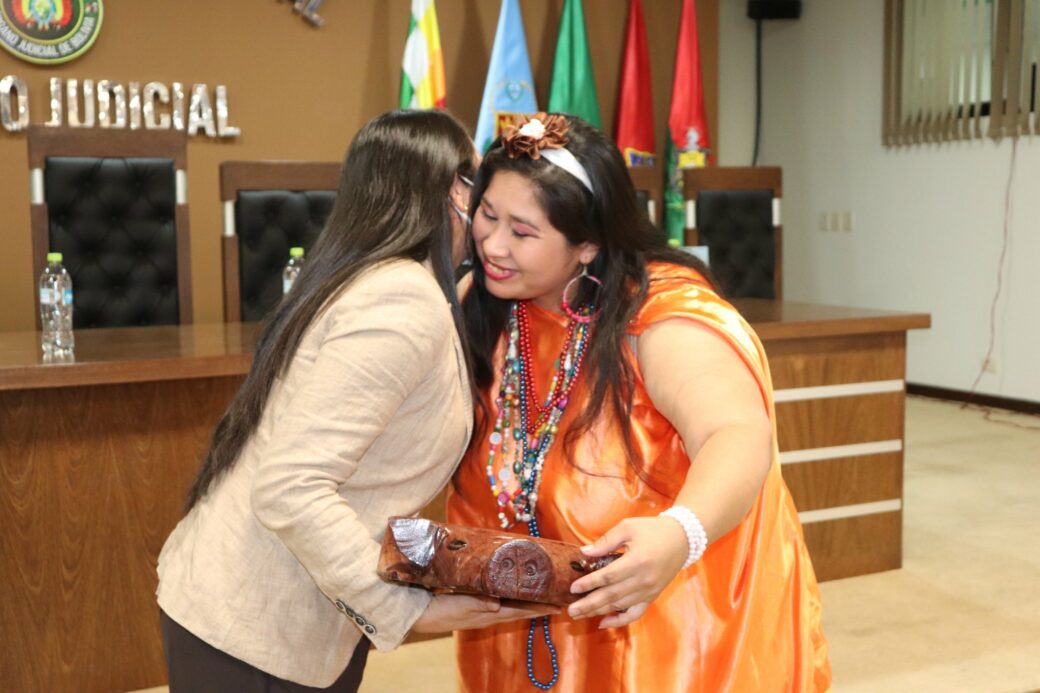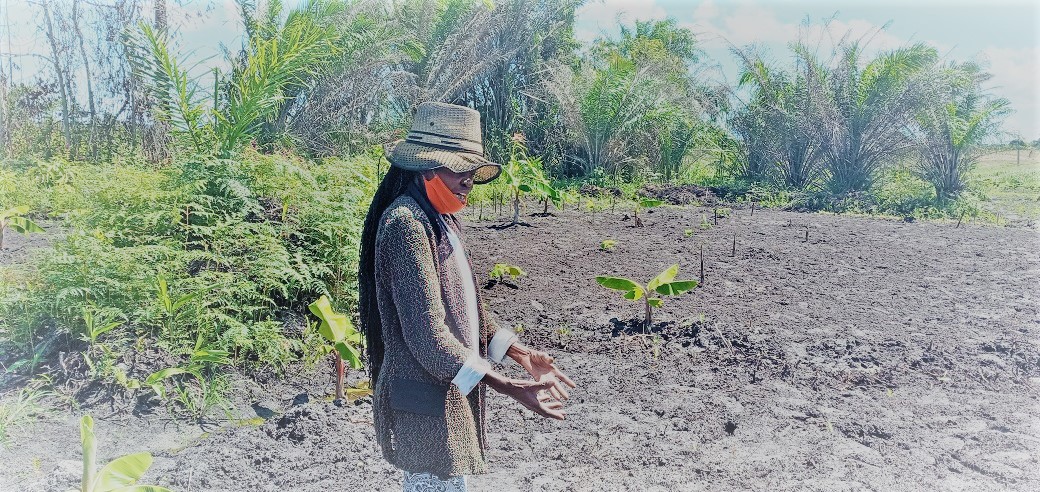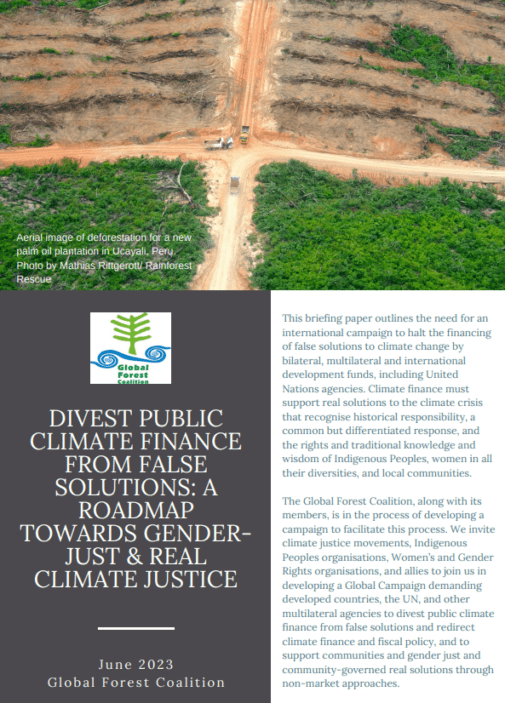Guaraní Women Leaders in Bolivia Share Successful Land Struggle on Indigenous Peoples’ Day

By: Valentina Figuera Martínez, GFC Gender Justice and Forests Campaign Coordinator | August 9, 2022 (photo by CCIMCAT)
Guaraní women leaders from Laguna Chica, which is located in the Department of Tarija in southern Bolivia, shared their fight to defend their Indigenous community territories (TCOs, in Spanish) and culture at an online event organized by the Global Forest Coalition on the International Day of the World’s Indigenous Peoples on August 9.
More than 50 participants from countries including Germany, Bolivia, Brazil, Chile, Colombia, Spain, the United States, the UK, Ghana, Philippines, France, Holland, India, Mexico, Russia, Switzerland, Uganda, and Venezuela learned about the struggles of Guaraní women to recover communal territories usurped by landowners in Bolivia’s Chaco region.
Mariela Melgar Ibáñez, gender officer of the Assembly of the Guaraní People of Yaku Igüa, said that for years her community had been made invisible, discriminated against, and suffered the dispossession of its lands. However, with the recovery of part of their ancestral territories, he said, the Guaraní people marked a milestone in a long struggle for land tenure. Together with other women leaders of the area, Melgar Ibáñez is one of the authors of a book about the struggle, Laguna Chica, published on June 22, 2022.
The lawsuit of the Guaraní community of Laguna Chica began before a Bolivian agro-environmental court in 2001, with the aim of obtaining the titling of ancestral lands as communal territory or CTO, a legal figure that contemplates spaces of collective property in which indigenous peoples develop their economic, social and cultural organization.
“20 years ago, we began the lawsuit to recover our territory and return what belongs to our people, so that we can live well, in harmony with nature, applying our customs, our way of being or, as we say, our ñandereko,” the leader said.
Of the 75,000 hectares desired, the community has only been able to recover 600 hectares in a fragmented way, and they only have executory title for 230 hectares. But “led by the mburuvicha (Indigenous authority) Evarista Cadencia, we women have been fighting,” said Ibáñez. “The laws say it and we say it: these territories are ours because we have always existed here, our ancestors lived here,” she emphasized.
Modesta Medina, another Guaraní leader from Laguna Chica, encouraged women from other Indigenous communities around the world not to lose faith in the struggle for land tenure. “To our other sisters who live in different countries: keep on fighting, because you will succeed. Here in Bolivia, we have a lot to recover. That’s why I encourage you to keep making progress to reclaim territory. Don’t be demoralized, don’t lose heart. You’re going to achieve it as we have achieved it”, she emphasized.
During the process of reclaiming their territory, the Guaraní women faced threats, violations of their human and economic rights, and threats to their land tenure and food security. Despite the challenges, they have received institutional support for the empowerment of their leaders from the Training and Research Center for Peasant Women of Tarija (CCIMCAT) and the Women’s Coordinating Committee (Coordinadora de la Mujer). Medina said, “We suffer from lack of water, from rain, from institutions, but here we feel freer, we work the land, we sow our seeds.”
Another challenge Medina mentioned is the deterioration of the local environment at the hands of landowners in the area, who deforested the region with the development of extractive soybean projects. “We are reforesting because all the trees have been cut down. They thought they were the owners, but now this place belongs to us and we’re taking care of it,” she said.
Elizabeth Cornejo, a magistrate in Bolivia’s Plurinational Constitutional Tribunal of Bolivia and another of the event’s panelists, explained that the land claims were consolidated thanks to the strength of organized Guaraní women. The Bolivian Constitution recognizes the multiethnic, multicultural, linguistic, and legal plurality of the original Indigenous peoples, as well as their territorial rights over ancestral lands.
“These brave Guarani women have lived for many years under harsh conditions of dispossession, persecution, threats, and even adverse weather conditions as a result of extractivism and deforestation, which have constantly put their lives at risk. They are an example of the exercise of rights, of the struggle to gain access to basic rights like access to land,” Cornejo said.
Rosario Ricaldi, executive director of CCIMCAT, commented on the empowerment of the Guaraní women in the Chaco to secure land tenure. “In Bolivia, we are moving from being a Republic to a plurinational State. This is not only a change in name, but it also implies, according to Article 1 of the Constitution, recognizing the legal, democratic, and identity-related plurality of our country, as well as the existence of Indigenous peoples,” she said.
Another institution supporting the process of struggle of this Guaraní community is the Coordinadora de la Mujer (Women’s Coordinating Committee). Executive Director Tania Sánchez Montaño shared the strategic actions for wealth redistribution and women’s political participation. In this sense, she commented that women’s land tenure implies access to natural resources, empowerment for their effective participation in decision-making in their territories, social, political, economic, and cultural recognition in their community, and access to credit, training, technology, and productive projects for territorial management.
“Access to territory, to land tenure, is fundamental to vindicate both economic and social rights and also strengthen the political participation of women based on their customs and practices, as well as democracy,” said Sanchez.
The event also showcased the territory and other faces behind this struggle through a video that was shown about the history of women’s organizing in Laguna Chica.
In case you missed it, you can watch a full video of the event on Indigenous People’s Day.








